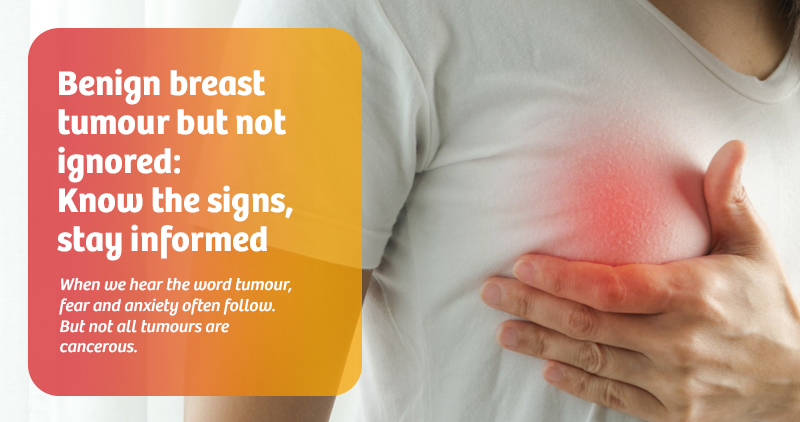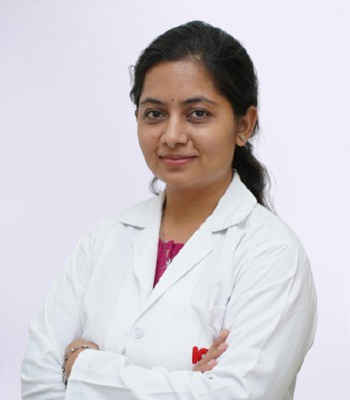

By Dr Margi Hirapara
Consultant Breast Surgeon
Oct 03, 2025
When we hear the word tumour, fear and anxiety often follow. But not all tumours are cancerous. Many breast lumps and growths are benign, non-cancerous and typically not life-threatening. In fact, benign breast tumours are far more common than malignant ones, especially in younger women. Understanding these conditions helps reduce unnecessary panic, supports early diagnosis, and ensures timely and appropriate care.
A benign breast tumour is an abnormal but non-cancerous growth within the breast tissue. Unlike cancer, these tumours do not invade surrounding tissue or spread to other parts of the body. Though they may cause discomfort or noticeable breast changes, they are generally not dangerous.
Benign breast conditions are prevalent among women of reproductive age. Studies indicate that more than 80% of breast lumps evaluated clinically turn out to be benign. However, it is essential to have any new breast lump evaluated by a qualified healthcare professional to rule out malignancy.
Most benign breast tumours are associated with hormonal fluctuations, particularly those related to
Hormones such as estrogen and progesterone influence breast tissue and can lead to the development of lumps.
Other potential causes include
Benign tumours may sometimes be symptomless, but in many cases, women may notice
It is important to note that these symptoms may resemble those of breast cancer. That’s why early evaluation is crucial.
Proper diagnosis involves multiple steps
1. Clinical breast examination
A physical exam by a trained doctor to assess lump size, texture, and mobility.
2. Imaging tests
3. Biopsy
If imaging is inconclusive or the lump appears suspicious, a sample of the tissue may be taken through
A biopsy confirms whether the tumour is benign or malignant.
At KD Hospital, we utilise advanced imaging technologies and collaborate within a multidisciplinary team comprising oncologists, radiologists, breast surgeons, and interventional radiologists to ensure accurate diagnoses and comprehensive care.
Treatment varies depending on the tumour type, size, symptoms, and patient preferences.
1. Observation (Watchful waiting)
Small, harmless lumps such as fibroadenomas or cysts often don’t require immediate treatment and can be safely monitored with regular check-ups.
2. Medications
3. Surgical excision
Surgery may be advised if the tumour
4. Supportive lifestyle measures
At KD Hospital, we offer both conventional and minimally invasive surgical options, including hidden scar surgery and VABB (Vacuum-assisted breast biopsy), to ensure the best outcomes with minimal discomfort and faster recovery.
In most cases, benign tumours do not become cancerous. However, certain types—such as atypical hyperplasia or complex fibroadenomas—may carry a slightly increased risk of developing breast cancer in the future. For such patients, doctors may recommend
At KD Hospital, our oncology specialists provide comprehensive risk profiling and surveillance strategies, ensuring high-risk patients receive appropriate, continuous monitoring.
Seek medical consultation if you notice
Early evaluation helps distinguish between benign and malignant conditions, ensuring prompt and appropriate care.
As a leading cancer and breast care centre in Ahmedabad, KD Hospital offers an integrated approach to breast health
We believe that being proactive about breast health is a powerful act of self-care. Whether it’s through regular screenings, timely check-ups, or seeking expert help when needed, every step you take matters.
KD Hospital is committed to walking with you at every stage of your breast health journey — from awareness to diagnosis, from treatment to complete wellness.
Leading cancer hospital in Ahmedabad.
benign breast tumours are common and often harmless. However, because their symptoms can mirror of breast cancer, it's essential to take all breast changes seriously and consult a healthcare professional. With proper evaluation, most cases can be managed conservatively or treated effectively.
At KD Hospital, we are committed to empowering women with knowledge, support, and advanced care. Our comprehensive breast health services—from screening and diagnosis to counselling and treatment—aim to ensure that every woman receives the best possible care at every stage of her journey.
Being proactive about breast health is a powerful act of self-care. Regular self-exams, clinical check-ups, and staying informed are simple yet impactful ways to stay ahead, and KD Hospital is here with you every step of the way.